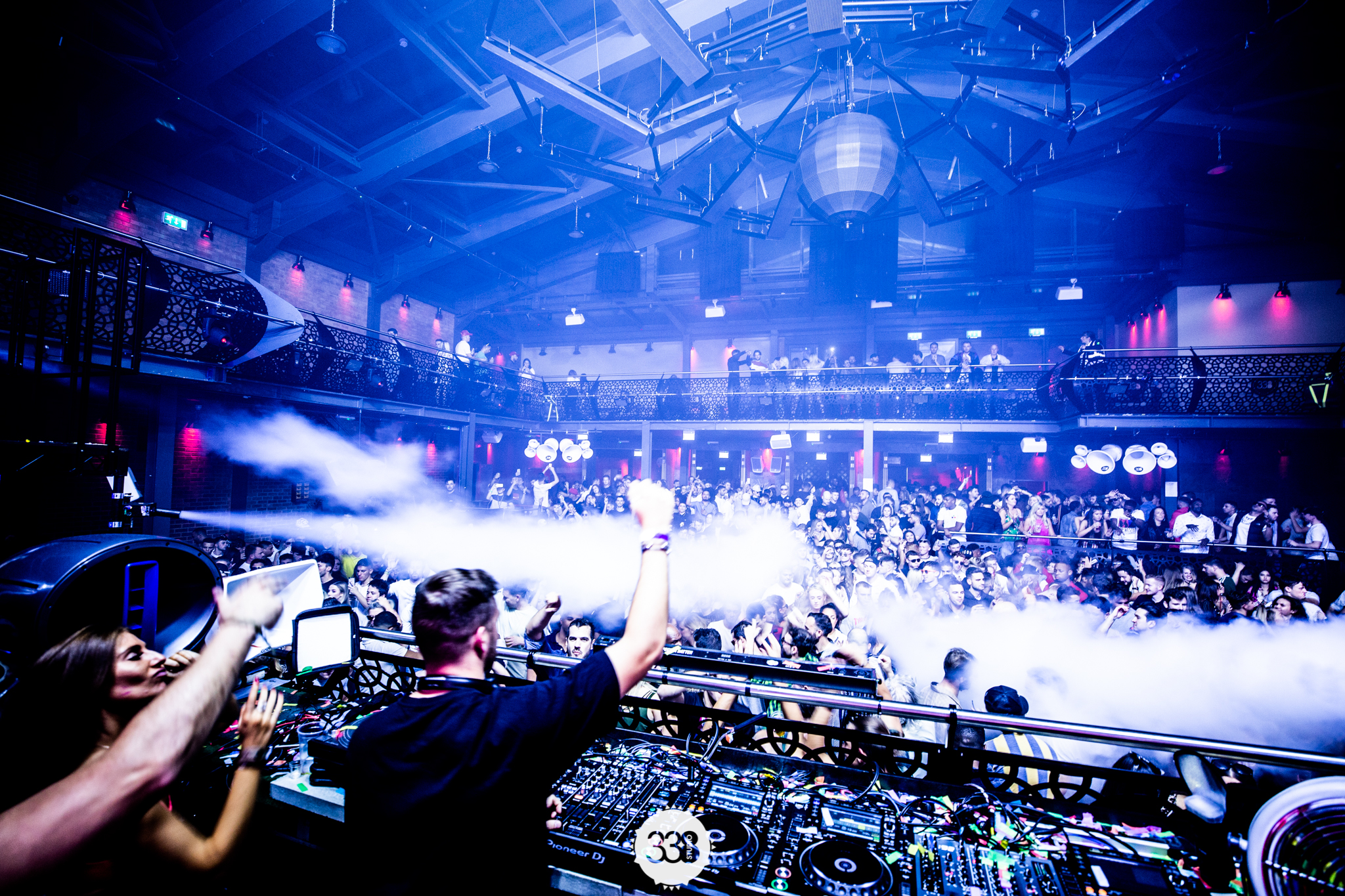On-Trade Progress met with Larry Field, technical manager and sound engineer at one of London’s hottest venues – Studio 338.
Please Introduce yourself and your position within the venue.
My name is Larry Field, I’m the technical manager and sound engineer at studio 338 I installed the venue’s Void sound system in all 3 rooms and manage the technical crew for all production.
How vital of a part do you feel venues play in the UK music scene?
I’ve also been a signed musician in touring bands through the 90’s so the live music scene for me has been crucial to that when I came to promoting material. The gap between the Live artist events bands etc and DJ club events has become closer today than ever before simply because of technology. With tools like Ableton Live software and other sampling programs, artists are capable of mixing and producing music with just a laptop and soundcard. This makes for easier setups in venues
The music itself becomes more bespoke to the vibe of the night as track arrangements can be quickly changed and manipulated to suit the crowd response. This seems to evolve a new type of “musician” on the DJ circuit where the term ‘Disk Jockey’ should now even be expanded. Loops and samples are mostly free, vast & accessible these days so there is an abundance of DJ mixes becoming more key to the performance rather than an old school mix copied off the radio as it used to be, so kids can listen at home or in the car. Live streams of events are now leading the way and social media posts are instant, so it makes people want to be at the venue.
Pioneer have just installed KUVO devices in our venue so that the listeners can log into Rekordbox and get the actual track names whilst DJs are playing. This is more popular in Europe than the UK now, as DJs prefer to be exclusive & more underground. For these reasons, venues and festivals have been expanding across the world and they only seem to be growing in numbers. Most festivals have doubled in size. The UK has always been a challenge to break through new music artists (I was one of them for a few decades), the size of the country means that more frequent tours and constant radio play is essential to maintain exposure. People lose interest fast, where as in the USA much more time would be spent on touring, months on end. Americans have much more attention & knowledge on writers and producers than the UK audience would have.
As sound systems get better, louder and more efficient, the experience at any venue becomes even more memorable. So, the race for the best sound has more attention now than ever before. Venues have learned that louder is not always best, but clean & powerful tuning makes the difference, so that the experience has more impact. Technical folk have always understood the importance of the room & acoustical environment and have known the importance of venue materials, design and layout. It is an extension of the sound system and this has become a more mainstream understanding these days with increased regulations on noise pollution and attention to sound proofing.
Venues still play a big part in the UK music scene as the necessity to play in front of large audiences can still create a big buzz and a platform for new comers, but this also goes hand in hand with the entire production package as events promoters battle to become bigger and better than previous shows pushing the boundaries. The importance of the entire event going well is also key for the music styles to have impact so venues in the UK have an important role in keeping high standards and creating new ideas.

What are some of the initial challenges’ venues could encounter when beginning to offer live music?
Hosting a live band is much more involved than say a DJ set up. as musicians and monitoring on stage sound becomes more important than the front of house sound initially because if a musician’s on-stage monitoring is good then the age-old assumption is good sound good performance. IEM in-ear monitoring is becoming more popular but even then, a large portion of sound can also be “felt” not just heard so the performers experience can depend on their monitoring. The acoustics of a large venue like ours becomes crucial to live music performers.
You can get away with a lively acoustic room with DJs, but Live musicians on stage is a whole new ball game. Studio 338 is not quite there yet as far as acoustics but since we have only been open a year now, we have already achieved the impossible. Much thought and analysis is currently going in to some further acoustic treatment for the large room here. Another challenge for a venue offering live music in the venue is set times. Live music has a very specific set up and obviously uses much more space in contrast to DJs setups. There is more flexibility with a DJs layout and keeping the party flowing is easy but with live band acts, once sound checked, there is more scope for technical issues or delay in performance time, change overs and so on.
What advice would you give to a venue considering holding a live music event?
If possible, enclose your subs in concrete, ideally a concrete stage is best. At high SPL this instantly solves a lot of feedback and on-stage monitoring issues where bass becomes a problem. We have done this at Studio 338, and it forces the low frequency energy forward to the crowd creating little interference on stage. It also saves a ton on your electric bill because the bass amplifiers are not having to work very hard to supply the right amount of bass to the audience.
We also put a thick layer of dense rubber on the stage & on the dance floor which acts as a nice acoustic absorber and is great for the standing audience/dancers and the artists on stage. That experience has become quite a talking point for our venue. It seems the detail in comfort is crucially incremental at every stage of enhancing the punters experience. My most important advice would be acoustics, acoustics and acoustics!!! I can’t emphasise how important this is for artists and audience. I’ve toured in bands with the likes of ABC, Gabriel, Olive, KD-Lang, Gloria Estephan, Nial Rogers, Rosala, and tons more over the years and it’s safe to say that every artist knows what venue they like the most when it comes to sound. This is mainly because of the acoustic treatment not just the sound system.
For a live venue you want it acoustically absorbed so the decay time is short and linear (ideally just under 1ms), meaning that if you clap your hands, the sound disperses quickly and evenly. Bass is always the toughest to get right so absorbent panels & sound clouds are usually the way to go using the quarter wave length principle (distance the panel is hung from the surface to interfere with the appropriate low frequencies).Obviously a classical venue is the opposite .Decay time needs to carry further as they only have the acoustics to carry the sound to the listener.
My father is the sound technician at the Yehudi Menuhin hall in Surrey and they spent over £2million on the acoustic treatment and design but that’s the extreme end of the budget scale though. Having worked in recording studios all my life like Abbey Road, it’s ironic that I find myself working in a Live venue called Studio 338 as most of the budget in any recording studio goes on acoustic treatment & soundproofing. We get many compliments on the sound system in our venue and although not quite there yet, my goal is to make Studio 338 one of the best sounding venues in the world, my benchmark being clubs like “Blitz” in Munich who, surprise-surprise, spent a large amount of their budget on acoustic treatment.
It’s also important to note that these days there is not a huge lot of difference in many of the pro audio sound systems any more as the threshold of excellence has tightened. You’ll find pretty much the same brand of drivers in most of the top range speakers. This means that the installed speaker positions, DSP programming and acoustic treatment are more important to a venue than ever before.

How does Studio 338 stand out from the crowd?
Location helps a lot. being in London right next to the 02 has proved to be a prime spot. Our venue, promoted as an Ibiza style super venue with a glass roof is the only one in London I think, so all those holiday memories can be recaptured right at home in the UK as they watch the sun come up over canary wharf. It’s been a successful formula so far, I’ve even had other venues ask me about the cost of a glass roof structure. Our big, wide stage & the height of the apex steel structure gives us loads of creative production possibilities, so each event can be completely different from the next.



